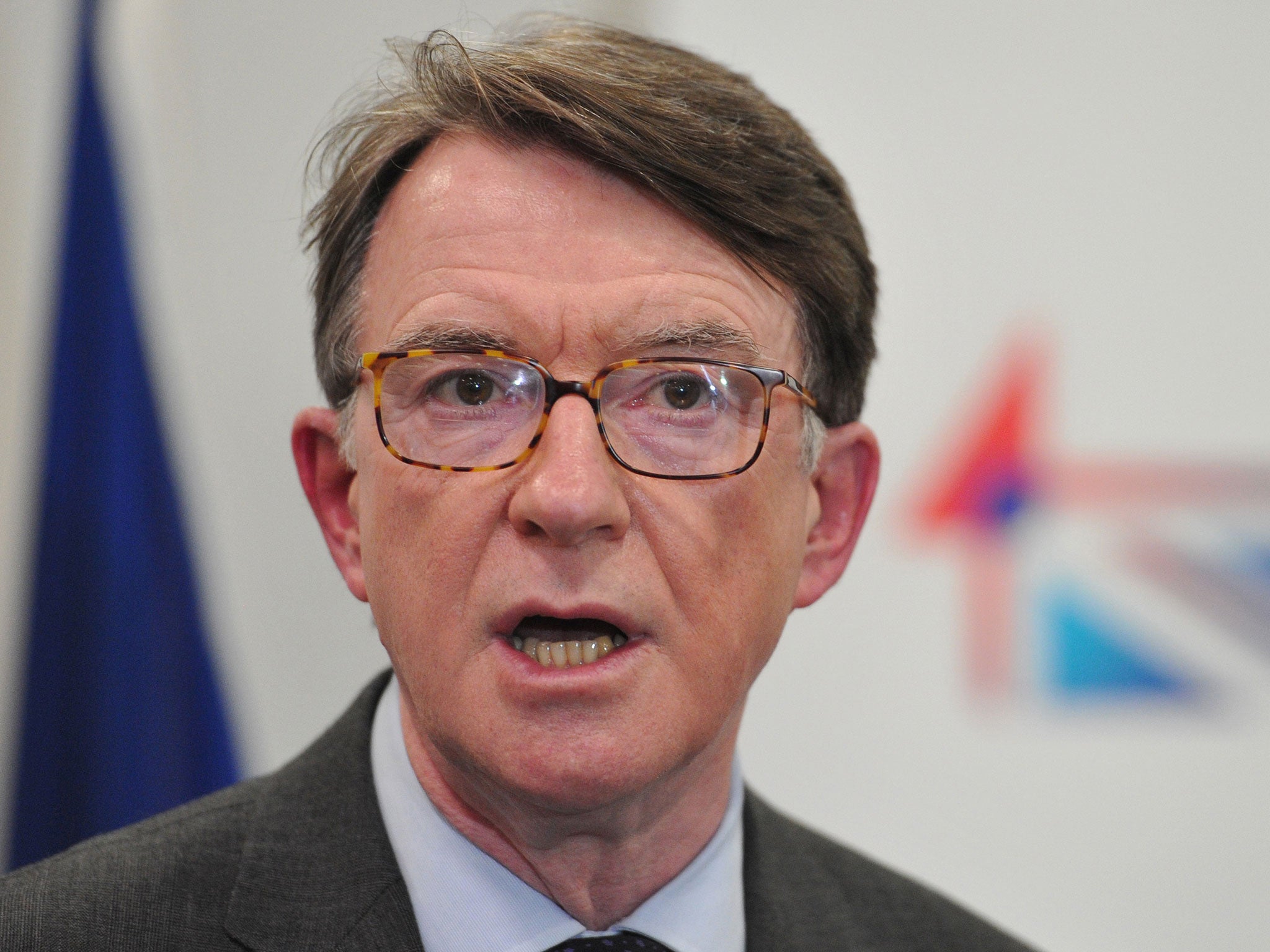Labour power-bill freeze ‘will help two million firms’... but Coalition – and Lord Mandelson – are no fans of Ed Miliband's pledge
Former Labour business secretary says proposal to restrict bills for 20 months could undo years of his work under Blair and Brown

Your support helps us to tell the story
From reproductive rights to climate change to Big Tech, The Independent is on the ground when the story is developing. Whether it's investigating the financials of Elon Musk's pro-Trump PAC or producing our latest documentary, 'The A Word', which shines a light on the American women fighting for reproductive rights, we know how important it is to parse out the facts from the messaging.
At such a critical moment in US history, we need reporters on the ground. Your donation allows us to keep sending journalists to speak to both sides of the story.
The Independent is trusted by Americans across the entire political spectrum. And unlike many other quality news outlets, we choose not to lock Americans out of our reporting and analysis with paywalls. We believe quality journalism should be available to everyone, paid for by those who can afford it.
Your support makes all the difference.More than two million businesses would benefit from Ed Miliband’s controversial plans to freeze electricity and gas prices if Labour wins the next election, according to a government analysis obtained by The Independent.
Coalition ministers have been heavily critical of his proposal, under which the “big six” power companies would have to peg their charges for 20 months, while the former Labour Business Secretary Lord Mandelson claimed it would set the party back.
According to research by the Department for Energy and Climate Change, 2.4 million companies and 27.3 million households were registered as electricity consumers in 2011.
Critics of the plans have labelled them as anti-business. But senior Labour figures seized on the statistics as evidence the plans would be widely popular among small and medium-sized companies, as well as with entrepreneurs trying to get firms off the ground .
Writing in The Independent, Lord Adonis, the former Cabinet minister, says: “Six entrenched energy companies are fighting Ed Miliband’s proposals; 2.4 million businesses will welcome it.”
Ed Balls, the shadow Chancellor, said: “Labour’s energy market reforms are pro-consumers and pro-business and pro-investment too. Energy is the second biggest cost for small firms.”
He added: “As Ed Miliband said in his letter to the energy companies, a fairer market for consumers must be matched by a better long-term deal for investors, giving them the stability and predictability they need to invest.”
Labour claims the price freeze, which would run between the general election in May 2015 and January 2017, would save businesses an average of £1,800 and households an average of £120, but would cost the energy giants £4.5bn.
However, Lord Mandelson told The Independent on Wednesday: “As a result of the [Miliband] speech, I believe that perceptions of Labour policy are in danger of being taken backwards.”
Labour leaders authorised a fight-back against his intervention, including the suggestion that he could have been motivated by his business links with energy companies.
Caroline Flint, the shadow Energy and Climate Change Secretary, said: “I know Lord Mandelson has financial interests in energy companies… I’m speaking up for consumers and businesses, [who] are going to be helped by Labour’s policies.
“Lord Mandelson may not have to worry about his energy bills, but a lot of consumers and businesses do.”
The Labour peer is the chairman of Global Counsel, a business consultancy which lists energy among its areas of expertise, but does not name any clients. He does not list his clients in the House of Lords Register of Interests.
Global Counsel said its energy clients were all overseas and it had no contracts with any of the six firms which would be affected by Mr Miliband’s plans.
But the Labour MP John Mann said: “These former ministers would be much better off having a period of silence. I don’t think they are adding anything to the debate, particularly when there’s a perceived vested self-interest. It smacks of lobbying.”
The Conservative MP Priti Patel said the episode underlined the need for complete transparency by parliamentarians about their outside earnings. She said Lord Mandelson should know the importance of “sending out a very strong and clear message to clients and future clients that he is an individual with integrity”.
Labour pointed out that Lord Mandelson was one of the architects of the “windfall tax” imposed by Tony Blair’s government in 1997 on the privatised utilities’ profits.
A source said: “The energy companies have interfered with the free market – not us. We are having a price freeze while we deliver proper market conditions.”
Tony Blair refused to be drawn on his opinion of the price-freeze policy, suggesting he could have private reservations about its wisdom.
“I’m not really going to comment on Ed’s conference speech. It seemed to go down very well with people and was excellently delivered,” he told Sky News. “But I’m not going to comment on the policy. He’s got the job of being leader of the opposition. I did that job for three years, I know how tough it is. I’m not going to get in his way on it.”
Join our commenting forum
Join thought-provoking conversations, follow other Independent readers and see their replies
Comments